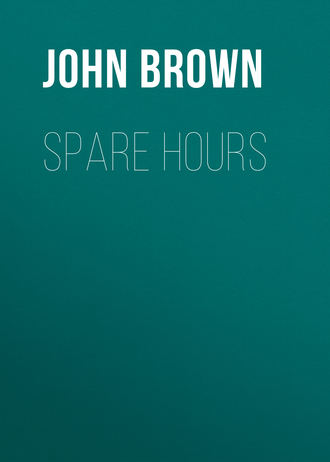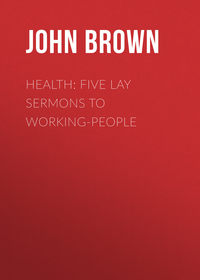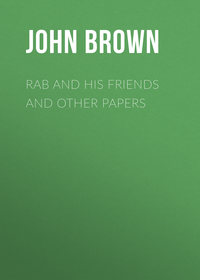 полная версия
полная версияSpare Hours
46
Mark i. 35; Luke xxi. 37.
47
Gen. ix. 16.
48
n his Preface he explains the title Bornnatural, as meaning “one who inherits the natural sentiments and tastes to which he was born, still artunsullied and customfree.”
49
ex. gr.—Konstantinopolitanischerdudelsackspfeifergeselle. Here is a word as long as the sea-serpent – but, like it, having a head and tail, being what lawyers call unum quid– not an up and down series of infatuated phocæ, as Professor Owen somewhat insolently asserts. Here is what the Bornnatural would have made of it —
A Constantinopolitanbagpiperoutofhisapprenticeship.
50
We have not noticed his iterativeness, his reiterativeness, because it flowed naturally from his primary qualities. In speaking it was effective, and to us pleasing, because there was some new modulation, some addition in the manner, just as the sea never sets up one wave exactly like the last or the next. But in his books it did somewhere encumber his thoughts, and the reader’s progress and profit. It did not arise, as in many lesser men, from his having said his say – from his having no more in him; much less did it arise from conceit, either of his idea or of his way of stating it; but from the intensity with which the sensation of the idea – if we may use the expression – made its first mark on his mind. Truth to him never seemed to lose its first freshness, its edge, its flavor; and Divine truth, we know, had come to him so suddenly, so fully, at mid-day, when he was in the very prime of his knowledge and his power and quickness – had so possessed his entire nature, as if, like him who was journeying to Damascus, a Great Light had shone round about him – that whenever he reproduced that condition, he began afresh, and with his whole utterance, to proclaim it. He could not but speak the things he had seen and felt, and heard and believed; and he did it much in the same way, and in the same words, for the thoughts and affections and posture of his soul were the same. Like all men of vivid perception and keen sensibility, his mind and his body continued under impressions, both material and spiritual, after the objects were gone. A curious instance of this occurs to us. Some years ago, he roamed up and down through the woods near Auchindinny, with two boys as companions. It was the first burst of summer, and the trees were more than usually enriched with leaves. He wandered about delighted, silent, looking at the leaves, “thick and numberless.” As the three went on, they came suddenly upon a high brick wall, newly built, for peach-trees, not yet planted. Dr. Chalmers halted, and looking steadfastly at the wall, exclaimed most earnestly, ” What foliage! what foliage!” The boys looked at one another, and said nothing; but on getting home, expressed their astonishment at this very puzzling phenomenon. What a difference! leaves and parallelograms; a forest and a brick wall!
51
“And I looked, and behold, a pale horse; and his name that sat on him was Death, and Hell followed with him.” – Rev. vi. 8.
52
This seems to have been the view taken by Calvin, but with that logical acuteness which was characteristic of him, he at the same time perceived that it was inaccordant with the expression, “if it had been possible.” In his commentary upon the passage, therefore, he substitutes “si opus sit” for the apostle’s words; thus, of course, assuming that St. Paul had adopted an inapt phrase to express his meaning. But I need scarcely say that such a mode of interpretation is altogether inadmissible, the only legitimate rule being to take the words of the text as they stand, and thence to infer the circumstances or conditions under which they were used.
53
See Robinson’s Lexicon to the New Testament, sub voce διὰ.
54
It has been suggested to me that the state of St. Paul’s eyesight might also furnish an explanation of his mistake in not recognizing the High Priest, which is recorded in Acts xxiii. 5, and about which some difficulty has been felt by commentators. One can picture the great apostle, who was a thorough gentleman, stretching forward, and shading his eyes, to see better, and saying, “Pardon me, I did not see it was the High Priest.” “I wist not.”
55
It may be worth mentioning here, that an opinion prevails in the Roman Catholic Church, that persons who have been favored with Divine visions, or to whom God wishes to give a token of his peculiar love, are frequently marked by what are specifically called stigmas. I have not met with any account of the grounds on which this opinion is founded: but the stigmas are explained to be the marks of the Saviour’s five wounds. It is very likely that the notion is nothing more than a fantastic and superstitious explanation of the passage in Galatians vi. 17. But it is not altogether impossible that it may be the faint and imperfect echo of some early tradition in the Church as to the physical effect produced upon St. Paul by Christ’s miraculous appearance to him near Damascus. Whatever be its origin, the existence of such an opinion is not without a certain degree of curiosity and interest.
56
Lob-lye-by-the-fire.
57
On one occasion, Brownie had undertaken to gather the sheep into the bught by an early hour, and so zealously did he perform his task, that not only was there not one sheep left on the hill, but he had also collected a number of hares, which were found fairly penned along with them. Upon being congratulated on his extraordinary success, Brownie exclaimed, “Confound thae wee gray anes! they cost me mair trouble than a’ the lave o’ them.”
58
A communion cup, belonging to M’Millan, the well-known ousted minister of Balmaghie, and founder of the sect of Covenanters of his name. This cup was treasured by a zealous disciple in the parish of Kirkcowan, and long used as a test by which to ascertain the orthodoxy of suspected persons. If, on taking it into his hand, the person trembled, or gave other symptoms of agitation, he was denounced as having bowed the knee to Baal, and sacrificed at the altar of idolatry.
59
Originally prefixed to a Criticism on some paintings in the Scottish Academy.
60
In the thin octavo, The Office of the State, and in its twin volume on Church Polity, there will be found in clear, strong, and singularly candid language, the first lines of the sciences of Church and State politics. It does not say much for the sense and perspicuity of the public mind, if two such books are allowed to fall aside, and such a farrago of energetic nonsense and error as Mr. Buckle’s first, and we trust last, volume on Civilization, is read and admired, and bought, with its bad logic, its bad facts, and its had conclusions. In bulk and in value his volume stands in the same relation to Mr. Dick’s, as a handful, I may say a gowpen of chaff does to a grain of wheat, or a bushel of sawdust to an ounce of meal.
61
In our excellent National Gallery (Edinburgh), a copy of Titian’s Ariadne in Naxos is hung immediately above Wilkie’s sacred sketch of John Knox administering the Sacrament in Calder House!
62
This great writer was first acknowledged as such by our big quarterlies, in the North British Review, fourteen years ago, as follows: —
“This is a very extraordinary and a very delightful book, full of truth and goodness, of power and beauty. If genius may be considered (and it is as serviceable a definition as is current) that power by which one man produces for the use or the pleasure of his fellow-men, something at once new and true, then have we here its unmistakable and inestimable handiwork. Let our readers take our word for it, and read these volumes thoroughly, giving themselves up to the guidance of this most original thinker, and most attractive writer, and they will find not only that they are richer in true knowledge, and quickened in pure and heavenly affections, but they will open their eyes upon a now world – walk under an ampler heaven, and breathe a diviner air. There are few things more delightful or more rare, than to feel such a kindling up of the whole faculties as is produced by such a work as this; it adds a ‘precious seeing to the eye,’ – makes the ear more quick of apprehension, and, opening our whole inner-man to a new discipline, it fills us with gratitude as well as admiration towards him to whom we owe so much enjoyment. And what is more, and better than all this, everywhere throughout this work, we trace evidences of a deep reverence and godly fear – a perpetual, though subdued acknowledgment of the Almighty, as the sum and substance, the beginning and the ending of all truth, of all power, of all goodness, and of all beauty.
“This book (Modern Painters) contains more true philosophy, more information of a strictly scientific kind, more original thought and exact observation of nature, more enlightened and serious enthusiasm, and more eloquent writing, than it would be easy to match, not merely in works of its own class, but in those of any class whatever. It gives us a new, and we think, the only true theory of beauty and sublimity; it asserts and proves the existence of a new element in landscape-painting, placing its prince upon his rightful throne; it unfolds and illustrates, with singular force, variety, and beauty, the laws of art; it explains and enforces the true nature and specific function of the imagination, with the precision and fulness of one having authority, – and all this delivered in language which, for purity and strength and native richness, would not have dishonored the early manhood of Jeremy Taylor, of Edmund Burke, or of the author’s own favorite Richard Hooker.” – J.B.



